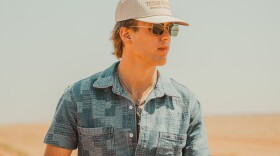Teddy Swims titled his last two albums I’ve Tried Everything But Therapy (Part 1 & Part 2). And there’s a therapeutic quality to the singer’s soul-stirring anthems like “Lose Control” and “Face Myself.”
So when will he make the big leap on to the couch?
“I was just [in therapy] today, actually,” Swims says by phone before a show in Chicago. “It’s been really great for me … to learn that every little emotion doesn’t have to eat me from the inside out. It just puts things into perspective, you know what I mean?”
In reality, few people can fathom what it means to be Teddy Swims at this whirlwind moment.
An unknown Atlanta singer a few years ago, he’s racked up billions of streams on Spotify, while Therapy (Part 2), released in January, has marched on to the top 10 sales charts in more than a dozen countries. In February, Swims earned a Grammy nod for best new artist, but lost to Chappell Roan.
On top of all that, he became a first-time dad in June when his girlfriend, singer Raiche Wright, gave birth to their son.
“It’s the coolest thing ever, man,” Swims, 32, says. “We’re about to get his little baby passport any day now so he can come on the road with me.”
Teddy Swims toiled for years in various rock and R&B bands before finally breaking out. But as is often the case in show biz, Swims’ “overnight” success was actually more than a decade in the making.
The singer — born Jaten Dimsdale — grew up in suburban Conyers, Ga., with dreams of playing in the NFL. But by 16, “I knew I wasn’t gonna make a living as a defensive tackle at 5 foot 7,” he says.
So he dived headfirst into high school musical theater, which led to singing in metal bands. After high school, he enrolled in cosmetology school but quit after getting a pep talk from his dad, a music fanatic who’d raised him on a steady diet of rock, country and Keith Sweat.
“He said ‘Son, I’ve worked my ass off to make sure that one day you can pursue your dreams and passions. … I think you need to drop out of school and give [music] your all. If you don’t give it your all, it’s never gonna happen for you.’”
And for years, it didn’t. He toiled in various rock and R&B bands, with little to show for it.
“People told us ‘Don’t quit your day job … you guys suck,’” he recalls with a laugh.
But with help from guitarist Jesse Hampton, his lifelong musical partner, Swims finally found his voice — a rich, soulful instrument that jumps easily from baritone to falsetto and back again.
He turned a hit series of YouTube cover songs into a contract with Warner Bros. Records and now, mass acclaim.
The key to unlocking his vocal style was learning to feel the emotion — not fake it.
“I might have completely moved on from an ex-girlfriend who broke my heart four years ago, but when I sing a song, you have to tap back into it,” he says. “It’s got to be three-and-a-half minutes of you just tearing that wound all the way back open and feeling it as deeply as you ever did. I’ve got to method act, is what I’m saying.”
While he knows how to strike a chord with listeners, Swims is still figuring out how to be level-headed and famous at the same time. He admits coping with a serious case of impostor syndrome.
“When I first started, I told myself if I can [succeed] in music, all my little problems would go away — not just financially, but even my self-image problems. I thought if outside people started telling me ‘You’re great’ or ‘You’re beautiful,’ I’d start feeling that way,” he says.
But when Swims did start to make it big, he felt even smaller.
“It was a rough time. I was really sinking. I was having this feeling of either ‘I’m lying to everybody’ or ‘Everybody’s lying to me.’”
A turning point arrived when he started hitting the gym regularly and practicing DDP Yoga, a fitness program created by former pro wrestler Diamond Dallas Page. And in recent months, the singer who threw shade on therapy in his album titles has started drawing strength from it.
“It’s given me a lot of validation … I’ve learned to navigate things I feel so deeply, and how I react to them, you know what I mean?” he says.
“It took a long time and a lot of work, but now I can say I love myself. Now, when people tell me I’m great, I believe them.”
Details
With opening act Cian Ducrot, 8 p.m. Thursday, Aug. 7, Toyota Music Factory, 300 W. Las Colinas Blvd., Irving, $99 and up. Ticketmaster.com.
Arts Access is an arts journalism collaboration powered by The Dallas Morning News and KERA.
This community-funded journalism initiative is funded by the Better Together Fund, Carol & Don Glendenning, City of Dallas OAC, Communities Foundation of Texas, The University of Texas at Dallas, The Dallas Foundation, Eugene McDermott Foundation, James & Gayle Halperin Foundation, Jennifer & Peter Altabef and The Meadows Foundation. The News and KERA retain full editorial control of Arts Access’ journalism.






